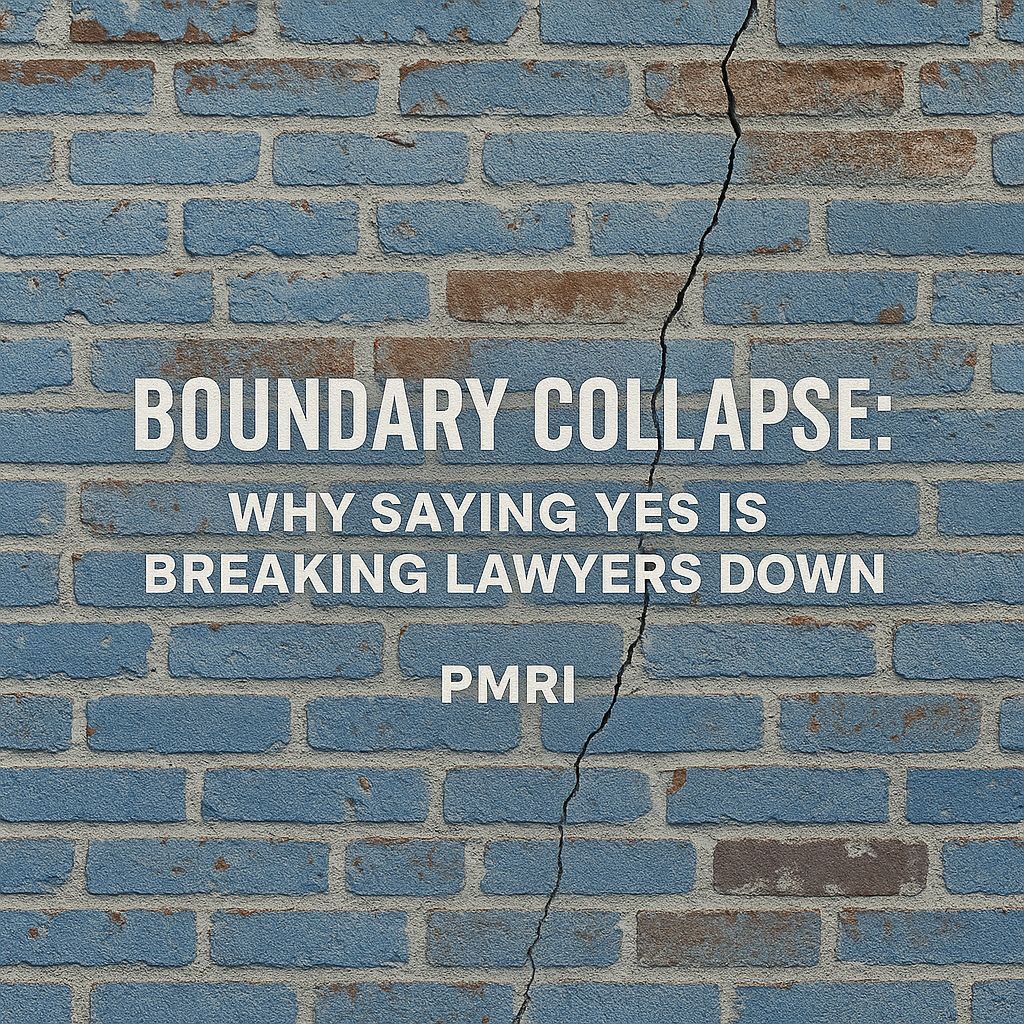You say yes because you are capable. Because you are responsible. Because the work matters. But eventually, yes becomes a default not a decision. And that is when it starts costing you.
Boundaries are not a luxury in legal practice. They are a structural requirement for clear thinking, regulated emotion, and sustainable performance. Without them, you are constantly available, mentally scattered, emotionally overexposed, and slowly detached from any sense of control.
This article explores why boundaries quietly collapse under pressure, how the legal system normalises that collapse, and what it costs when your time, energy, and attention are always open for withdrawal.
Why Boundaries Fail in Law
Lawyers are conditioned to be responsive, accessible, and high functioning regardless of how much is being asked. Saying yes becomes a professional reflex.
But when everything is urgent, and everything matters, you begin to lose the space between what is asked of you and what you choose to give. That space is where boundaries live.
Over time, you:
- Take on more than you should because it feels easier than explaining why not
- Say yes to clients, even when they overreach
- Answer after-hours messages to avoid seeming unavailable
- Push your own needs to the margins, believing they can wait
Eventually, your calendar fills, your focus splinters, and your motivation drops. You are doing more and feeling less connected to all of it.
The Neuroscience of Overextension
When you say yes constantly, your brain never gets the chance to fully switch off. The prefrontal cortex you are thinking and decision-making centre becomes overworked, and the amygdala the emotional reactivity centre starts driving the system.
This shift shows up as:
- Irritability over small requests
- Difficulty focusing for more than a few minutes at a time
- Feeling emotionally drained by routine matters
- Resentment you do not voice but cannot shake
Overextension creates chronic activation. And chronic activation is not resilience. It is depletion.
Boundaries Are Not Just External
The legal profession talks about boundaries as if they are solely about client demands or calendar control. But the most important boundaries are internal.
Internal boundaries are the limits you place on how much of your mental, emotional, and cognitive energy is spent outside of your conscious direction. They help define where your professional focus ends and your personal self begins.
Without strong internal boundaries, you:
- Mentally revisit conversations long after they are over
- Carry unspoken criticism or perfectionism into your home life
- Replay errors or perceived missteps on a loop
- Let one difficult case infect your mood, clarity, or energy across the rest of your day
Internal boundaries preserve your sense of self. They help you distinguish between urgency and importance, between reflection and rumination, and between focus and fixation.
To strengthen internal boundaries, consider building micro-checkpoints into your day:
- A 30-second transition pause between tasks to reset your attention
- A mental boundary ritual when closing a case file, reminding yourself “this is complete for now”
- A brief evening review where you name what you are no longer carrying into tomorrow
These habits help contain your focus, reduce cognitive drag, and prevent emotional spillover. They are subtle, but powerful. Because when your internal boundaries are strong, your external ones hold with far less effort. as if they are solely about client demands or calendar control. But the most important boundaries are internal.
- The boundary between your own thoughts and other people’s urgency
- The boundary between ending a matter and mentally carrying it home
- The boundary between productivity and performance the former is about quantity, the latter about clarity
Strong internal boundaries preserve focus, energy, and identity. Weak ones blur your sense of agency. You are still working but not from a grounded centre.
High-Impact Boundaries You Can Start Protecting
- Time Blocks That Do Not Get Moved
Protect one deep work block each day where no meetings, calls, or emails interrupt your thinking. - Device Separation After Hours
Use a second device or physically store your work phone after a set time. - Mental Closure Rituals
End each workday with a small act: closing a laptop, jotting a summary, or walking away with intention. This teaches your brain to release tension. - Deliberate Pausing Before Yes
When asked for something, do not answer immediately. Say: “Let me confirm and get back to you.” This creates space for intentional choice. - Reinforcing the Line
When clients or colleagues overstep, respond respectfully but clearly. “To give this the focus it needs, I’ll respond by tomorrow.” Boundaries can be firm and professional at the same time.
The Cost of Saying Yes to Everything
You do not burn out because you are weak. You burn out because you stay open to everything. You give away mental energy in fragments until your core focus is compromised.
The cost is not just personal:
- Quality of thought drops
- Strategic decision-making narrows
- Communication becomes reactive instead of measured
- Client experience suffers
- Motivation fades, even as output continues
Over time, the very thing that made you excellent your availability, your drive, your reliability becomes unsustainable.
Final Thought
Boundaries are not selfish. They are how you protect the part of you that delivers excellent legal work. Without them, even your best effort begins to fray.
You do not need to say no to everything. But you do need to decide what gets your attention because if you do not, everything will.
And that is how performance erodes: not in one dramatic collapse, but in quiet permission granted too many times.
If you are interested in mental performance training for yourself or your legal team, contact the Professional Mind Resilience Institute at info@pmri.co.za or visit www.pmri.co.za.


